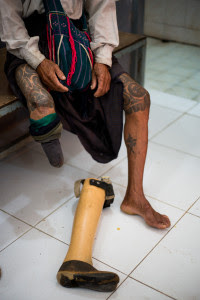At Mae Tao Clinic’s Prosthetic Department on the Thai-Burma border, the overwhelming majority of patients are land mine victims from Burma, human proof of the ongoing toll of more than six decades of armed conflict.
 Two men and a woman sit silent watching their new legs taking shape at Mae Tao Clinic’s prosthetic department. The two men and one woman each had a leg blown off when they stood on a landmine in Karen State.
Two men and a woman sit silent watching their new legs taking shape at Mae Tao Clinic’s prosthetic department. The two men and one woman each had a leg blown off when they stood on a landmine in Karen State.
A noticeboard on the wall of the prosthetic department shows the names of 54 patients have visited since February – it states that 52 of them have lost limbs to land mines, including the two men and the woman.
Saw Daniel, 38, has been making prosthetic limbs at Mae Tao Clinic for seven years. Originally from Hpa-An, Burma, he moved to Thailand nine years ago.
“My colleague and I make around 250 or 300 prostheses a year… Accidents and congenital diseases are a small number of the cases but the vast majority are from landmines,” he shouts to be heard above the noise of electric saws, shapers and files.
“The feet are from Cambodia, the fiberglass thighs and knees are from Bangkok while the wooden joints are from Burma,” Saw Daniel says, “making prosthetic limbs gives me a deep satisfaction because I am building something that will help people,” he adds.
A report in 2012 by Karen Human Rights Group, entitled ‘Uncertain Ground: Land mines in Eastern Burma,’ noted, “Eastern Burma is one of the most landmine contaminated places in the world.”
According to figures in Landmine Monitor, an independent organisation that has been monitoring land mine usage internationally for 16 years, there were 3,349 landmine casualties in Burma from 1999 to 2012 – including 319 deaths.
Land mines are especially insidious due to the fact that they affect the whole family – not just the victim. Victims spoke of their regret at being unable to work and provide for their families as they once did.
“I have lost two of my friends and my husband to land mines” Moo Juaw, 48, says, sitting on a small wooden bench in the corner of the room. She is from Kergaw Village, Myawaddy Township, Burma. “At least nine people have lost limbs to land mines in our village, some married couples each have a leg missing.” Moo Juaw came to Mae Tao Clinic’s prosthetic department with two men from her village, all needing new limbs.
Moo Juaw stepped on a land mine in 2005 when she was leading cows back to the village. She said that life was difficult not only for her, but also for her family since she had lost her leg. “Now I work on a tobacco farm to earn a little money to survive, but I can’t work as a rice farmer anymore because my [prosthetic] leg gets stuck in the mud so my adult children work on the rice paddy,” unable to support herself, she lives with her youngest son and his wife.
Moo Juaw said that fear had gripped the village because of the land mines. “Even if you are scared you have to survive – you have to keep going so you can live your life.” Moo Juaw says.
One man at the prosthetics department spoke about being used as a human minesweeper for the Burma Army. “They [Burma Army] forced me and two other friends from our local area to walk in front as ‘guides’ through the land mine area.” He had stood on a land mine twice, once in the mid-1970s and again in 1997. “I cannot work as a farmer anymore because of the lost leg,” he said, “Life is very hard. You cannot do things quickly, you cannot work like other people.”
International and regional landmine monitoring organisations state that mines are still being planted in Burma.
As cited in the 2012 Landmine Monitor the United Nation’s Special Rapporteur, Tomás Ojea Quintana said he was disturbed by reports that armed groups and the Burma Army are still using landmines despite a ceasefire been in place. Mr Quintana as quoted in the landmine Monitor report requested the government to, “work with international organizations to develop a comprehensive plan to end the use of landmines and to address their legacy, including the systematic removal of mines and rehabilitation of victims.”
Villagers in Karen State want the government to remove landmines so they can go about their daily lives without fear.
Saw Tha Thway, 40, also from Kergaw, was out cutting bamboo when he stood on a land mine. “One of the worst things is that now my children need to help me – rather than the other way around. My children cannot go to school because they need to help me with the farm. My one dream is that my children would have good opportunities in life but its hard – now there are no opportunities for them.”



